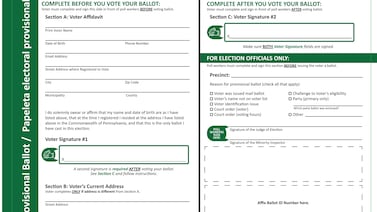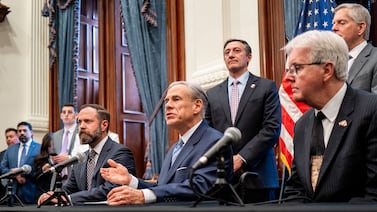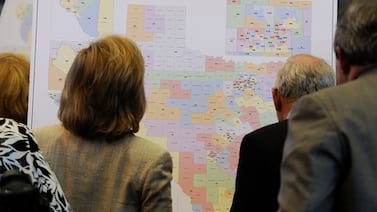A version of this post was originally distributed in Votebeat’s weekly newsletter.
A couple of weeks ago, Mother Jones published video of the head of Heritage Action for America (a sister organization of the Heritage Foundation) bragging about how easy it was to “quietly” and “quickly” craft the voting legislation in Georgia, Iowa, Texas, Wisconsin, and other states.
“In some cases, we actually draft [the legislation] for them,” Executive Director Jessica Anderson said, “or we have a sentinel on our behalf give them the model legislation so it has that grassroots, from-the-bottom-up type of vibe.”
The footage has continued to reverberate. Heritage Action now faces a possible ethics probe in Iowa, and activists in Texas have filed a complaint about the group with the state ethics commission. In the leaked video, Anderson said that “19 provisions” of the Texas voting bill were “written by the Heritage Foundation’s experts.” The complaint, filed by Progress Texas, alleges the group helped draft legislation even though it had not filed as a lobbyist during the 2021 legislative session.
“Texans deserve to know who is behind these voter suppression bills,” said Ed Espinoza, executive director at Progress Texas. “The leaked video of The Heritage Foundation’s event further proves that anti-voter bills are part of a coordinated, national voter suppression effort.”
As the New York Times reported in March, Heritage Action has been claiming credit for a number of bills that progressive activists say will suppress voting. Many of these bills will make voting harder. For example, a recent analysis by the Texas Tribune shows that the current voting bill in Texas would disproportionately impact urban voters of color in the state through polling place closures.
The Heritage Foundation has spent decades tilting at the voter fraud windmill, proving nothing and often embarrassing itself when questioned in court. It is certainly not new for advocacy groups to consult on and even draft legislation, but the opacity with which this organization has operated — and the fact that leaked video was necessary for lawmakers to understand the organization’s involvement — makes for a troubling look into the kitchen where these laws were cooked up.
Now for some history. The Heritage Foundation has beer to thank for its origins. Joseph Coors — yes, that Coors — was a founding member of the group and provided much of its initial funding in the 1970s. His goal was to create a D.C. think tank for conservatives that had just as much power and influence as the Brookings Institution. ‘’Without Joe Coors, the Heritage Foundation wouldn’t exist,’’ its president, Edwin Feulner, said in a New York times obituary for Coors, ‘’and the conservative movement it nurtures would be immeasurably poorer.’’ While the American Enterprise Institute had existed for some time, Coors and his co-founders felt the organization was too academic and its ideas lacked popular support, according to historical accounts of the organization’s rise. They envisioned a think tank that wouldn’t be afraid to get involved in legislative debates and would fight hard for its causes. They appear to have achieved that goal.
Back to present day:
- Here we go again! A judge in Georgia will allow 145,000 absentee ballots cast in Fulton County to be reviewed by a third party, in the vein of the Arizona audit. This judge, though, will allow only images of the ballots to be reviewed and will not require the county to hand over physical ballots to inspectors hired by Garland Favorito, a self-styled voting-integrity advocate. His background was summed up by Stephen Fowler at Georgia Public Broadcasting: “Favorito has also questioned the authenticity of events surrounding 9/11, pushed conspiracy theories about former President Bill Clinton and the assassination of John F. Kennedy and is now serving as the latest vessel for false claims of fraud with the 2020 election.”
- Also following in Arizona’s footsteps, a legislator in Wisconsin is now using taxpayer money to pay three retired cops to look into allegations of fraud during the 2020 election. As in every state, there is no evidence or even meaningful suggestion of widespread fraud. The investigation will last for three months and will not come to a conclusion that would change the overall results of the election.
- An attorney associated with Trump’s election conspiracies has also offered a free investigation to a county in northern Michigan into false allegations of fraudulent activity. The process and people the attorney offered were integral to a similar investigation in Michigan’s Antrim County, which ended in disaster, and an associated lawsuit was thrown out by a judge in May. The state had already conducted an audit, and the judge saw no reason to do two of them, so it’s unclear why this attorney thinks another attempt would be fruitful. The county in question, Cheboygan County, appears not to be interested in the offer anyway.
- Also in Michigan, Republicans unveiled legislation that would require additional forms of ID to be submitted when voting by mail. The original bill would have required voters to submit a photocopy of an ID with their absentee ballot application, removing a longtime provision that allowed them to submit an affidavit attesting to their eligibility instead. Clerks from both parties criticized the proposal due to identity theft fears and the lack of access to copiers by the elderly and the poor. An amendment to the bill allows voters to prove identity by jotting down their state ID number or last four digits of their Social Security number. Meghan Reckling, chief of staff for Sen. Lana Theis, who sponsors the bill, said it would fix a “glaring loophole” in the state’s security. Critics call the measure “pointless.”
- Liz Cheney might have become a hero for progressives when she wouldn’t back down in blaming Trump for the Jan. 6 insurrection, but her new fans shouldn’t get too far ahead of themselves. She says measures to “secure” elections are necessary, supports the laws many states are passing that would restrict voting access, and says she will never understand why people are against voter ID. In her interview with Axios on HBO, she wouldn’t say specifically why these laws are necessary but did say, “I think what we can all agree on is that what is happening right now is really dangerous.”
- NorthJersey.com is out with an enlightening piece comparing New Jersey’s voting laws to those of Georgia. Hint: Voting laws aren’t just bad in the South, y’all.
- The Atlanta Journal Constitution has published an interesting historical analysis of claims made by both conservatives and progressives that whatever is happening right now is “Jim Crow 2.0.”
- Luzerne County, Pennsylvania, will begin an investigation into the state’s electronic system used during last week’s primary. Electronic ballots for Republican races in the county were mislabeled as “Democrat” on Dominion voting machines, which Dominion has said was because of human error. The county is unsatisfied with Dominion’s responses, so the county council has asked the local district attorney to dive in.
- Investigators in the town of Windham, New Hampshire, have concluded an investigation into small discrepancies caused by the folding of ballots and have determined there was no voter fraud. The town, home to around 15,000 residents, drew national attention from the Trump campaign, which had used it as an example of fraudulent counting.
- A shocking (well, not really shocking so much as horrifying) report from the Anchorage, Alaska, city clerk’s office details “unprecedented harassment of election officials” and the “dissemination of disinformation to sow distrust among voters.” Workers were photographed, harassed in person and online, and subjected to threats.
- A Republican legislator in Arizona wants to criminally investigate those whose ballot signatures do not match the signature on file for the voter. Arizona already has a “curing” process by which mismatched signatures are investigated, and most are a result of aging, a physical disability or a quick signature made without thinking. Ballots that are legitimately fraudulent are already referred to local district attorneys.
This week, we break from our usual profiles of hobbyists to feature … FASHION.
Folks, it might not be infrastructure week but it is absolutely #ElectionWear week! In celebration of voting-themed shoes, arm bands, bedazzled hats, T-shirts (featuring love for “long romantic walks to the polls”), earrings, socks, 3-D printed masks, a Captain America costume, and so much more. Shout out to the St. Louis County election board for really stepping up their game with this fantastic video of the entire staff decked out at what, I imagine, was the most fun day in the office ever.

“I Voted” Fashion Week was organized by Brianna Lennon — the county clerk in Boone County, Missouri, and co-host of the podcast High Turnout, Wide Margins — who, with help from other election enthusiasts, themed each day.
“It really started as almost an inside joke—that so many of us have closets and offices full of voting gear because we’re really that nerdy. The more I thought about it, the more I thought it would be a creative way to show how ingrained our love of elections really is and provide a fun outlet after a stressful 2020,” she said. “The elections space is such a strong community that it was really nice to share in that positivity.”







